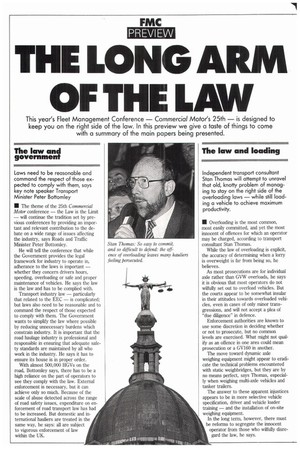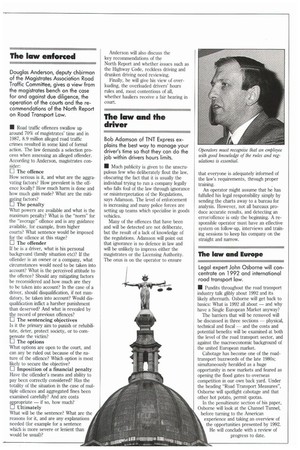THE LONG ARM OF THE LAW
Page 38

Page 39

If you've noticed an error in this article please click here to report it so we can fix it.
This year's Fleet Management Conference — Commercial Motor's 25th — is designed to keep you on the right side of the law. In this preview we give a taste of things to come with a summary of the main papers being presented.
The law and government
Laws need to be reasonable and command the respect of those expected to comply with them, says key note speaker Transport Minister Peter Bottomley • The theme of the 25th Commercial Motor conference — the Law is the Limit — will continue the tradition set by previous conferences by providing an irnportant and relevant contribution to the debate on a wide range of issues affecting the industry, says Roads and Traffic Minister Peter Bottomley.
He will tell the conference that while the Government provides the legal framework for industry to operate in, adherance to the laws is important — whether they concern drivers hours, speeding, overloading or safe and proper maintenance of vehicles. He says the law is the law and has to be complied with.
Transport industry law — particularly that related to the EEC — is complicated; but laws also need to be reasonable and to command the respect of those expected to comply with them. The Government wants to simplify the law where possible by reducing unnecessary burdens which constrain industry. It is important that the road haulage industry is professional and responsible in ensuring that adequate safety standards are maintained by all who work in the industry. He says it has to ensure its house is in proper order.
With almost 500,000 HGVs on the road, Bottomley says, there has to be a high reliance on the part of operators to see they comply with the law. External enforcement is necessary, but it can achieve only so much. Because of the scale of abuse detected across the range of road safety issues, expenditure on enforcement of road transport law has had to be increased. But domestic and international hauliers are treated in the same way, he says: all are subject to vigorous enforcement of law within the UK.
The law and loading
Independent transport consultant Stan Thomas will attempt to unravel that old, knotty problem of managing to stay on the right side of the overloading laws — while still loading a vehicle to achieve maximum productivity.
II Overloading is the most common, most easily committed, and yet the most innocent of offences for which an operator may be charged, according to transport consultant Stan Thomas.
While the law of overloading is explicit, the accuracy of determining when a lorry is overweight is far from being so, he believes.
As most prosecutions are for individual axle rather than GVW overloads, he says it is obvious that most operators do not wilfully set out to overload vehicles. But the courts appear to be somewhat insular in their attitudes towards overloaded vehicles, even in cases of only minor transgressions, and will not accept a plea of "due diligence" in defence.
Enforcement authorities are known to use some discretion in deciding whether or not to prosecute, but no common levels are exercised. What might not qualify as an offence in one area could mean prosecution or a GV160 in another.
The move toward dynamic axle weighing equipment might appear to eradicate the technical problems encountered with static weighbridges, but they are by no means perfect, says Thomas, especially when weighing multi-axle vehicles and tanker trailers.
The answer to these apparent injustices appears to be in more selective vehicle specification, driver and vehicle loader training — and the installation of on-site weighing equipment.
In the long term, however, there must be reforms to segregate the innocent operator from those who wilfully disregard the law, he says.
The law enforced
Douglas Anderson, deputy chairman of the Magistrates Association Road Traffic Committee, gives a view from the magistrates bench on the case for and against due diligence, the operation of the courts and the recommendations of the North Report on Road Transport Law.
• Road traffic offences swallow up around 70% of magistrates' time and in 1987, 8.9 million alleged road traffic crimes resulted in some kind of formal action. The law demands a selection process when assessing an alleged offender. According to Anderson, magistrates consider:
N The offence
How serious is it, and what are the aggravating factors? How prevalent is the offence locally? How much harm is done and how much gain made? What are the mitiElting factors? LJ The penalty What powers are available and what is the maximum penalty? What is the "norm" for the "average" offence and is any guidance available, for example, from higher courts? What sentence would be imposed for the offence at this stage? O The offender If he is a driver, what is his personal background (family situation etc)? If the offender is an owner or a company, what circumstances would need to be taken into account? What is the perceived attitude to the offence? Should any mitigating factors be reconsidered and how much are they to be taken into account? In the case of a driver, should disqualification, if not mandatory, be taken into account? Would disqualification inflict a harsher punishment than deserved? And what is revealed by the record of previous offences? 0 The sentencing objectives Is it the primary aim to punish or rehabilitate, deter, protect society, or to cornflsate the victim?
LJ The options What options are open to the court, and can any be ruled out because of the nature of the offence? Which option is most likely to secure the objective? O Imposition of a financial penalty Have the offender's means and ability to pay been correctly considered? Has the totality of the situation in the case of multiple offences and aggregated fines been examined carefully? And are costs appropriate — if so, how much? LJ Ultimately What will be the sentence? What are the reasons for it, and are any explanations needed (for example for a sentence which is more severe or lenient than would be usual)? Anderson will also discuss the key recommendations of the North Report and whether issues such as the Highway Code, reckless driving and drunken driving need reviewing.
Finally, he will give his view of overloading, the overloaded drivers' hours rules and, most contentious of all, whether hauliers receive a fair hearing in court.
The law and the driver
Bob Adamson of TNT Express explains the best way to manage your driver's time so that they can do the job within drivers hours limits.
• Much publicity is given to the unscrupulous few who deliberately flout the law, obscuring the fact that it is usually the individual trying to run a company legally who falls foul of the law through ignorance or misinterpretation of the Regulations, says Adamson. The level of enforcement is increasing and many police forces are setting up teams which specialise in goods vehicles.
Many of the offences that have been and will be detected are not deliberate, but the result of a lack of knowledge of the regulations. Adamson will point out that ignorance is no defence in law and will be unlikely to impress either the magistrates or the Licensing Authority. The onus is on the operator to ensure that everyone is adequately informed of the law's requirements, through proper training.
An operator might assume that he has fulfulled his legal responsibility simply by sending the charts away to a bureau for analysis. However, not all bureaux produce accurate results, and detecting an error/offence is only the beginning. A responsible operator must have an effective system on follow-up, interviews and training sessions to keep his company on the straight and narrow.
The law and Europe
Legal expert John Osborne will concentrate on 1 992 and international road transport law.
• Pundits throughout the road transport industry talk glibly about 1992 and its likely aftermath. Osborne will get back to basics: What is 1992 all about — and why have a Single European Market anyway?
The barriers that will be removed will be discussed in three sections — physical, technical and fiscal — and the costs and potential benefits will be examined at both the level of the road transport sector, and against the macroeconomic background of the united European market.
Cabotage has become one of the roadtransport buzzwords of the late 1980s; simultaneously heralded as a huge opportunity in new markets and feared as opening the flood gates to overseas competition in our own back yard. Under the heading "Road Transport Measures", Osborne will spotlight cabotage and that other hot potato, permit quotas.
In the penultimate section of his paper, Osborne will look at the Channel Tunnel, before turning to the American experience and taking an overview of the opportunities presented by 1992. He will conclude with a review of progress to date.




















































































































































